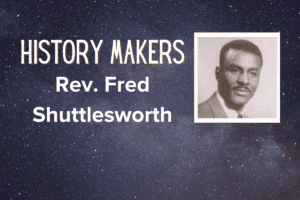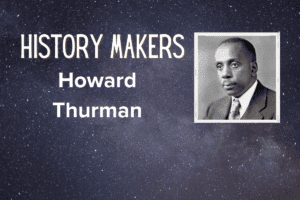(1901-1971)
“These people came here for help and for shelter. I am their shepherd, and a shepherd does not forsake his flock,” André Trocmé told Vichy authorities in 1942, calmly defying their orders to stop aiding the Jewish refugees who were making their way into his village in south central France. The Protestant pastor knew that he was risking both his freedom and
his life, but his conscience gave him no other way to respond. As many as 5,000 Jewish lives would eventually be saved because of the unshakable moral convictions of this remarkable man and the village he served.
Trocmé had arrived with his wife, Magda, and their four children in the small mountain village of Le Chambon sur Lignon eight years earlier. He had deliberately sought a remote parish where he could quietly pursue his belief in pacifism, a belief for which he had already gotten in trouble with the leaders of his Reformed Church denomination and a belief which had been taking root in him since childhood.
After completing a degree at St. Quentin University in 1918, Trocmé went to Paris to study religion at the Sorbonne. During his six years there, he was increasingly drawn to the beliefs of the International Fellowship of Reconciliation (IFOR), an ecumenical pacifist organization founded in response to the horrors of the recent war in Europe, and in 1923 Trocmé helped establish IFOR’s French chapter. In 1925, seeking a course of study that emphasized social action as well as theology, he enrolled at New York’s Union Theological Seminary. Upon his return to France the following year, he took a pastorate in a northern mining village. There he brought out his pacifist beliefs in full force, giving sermons on the subject, hosting pacifist youth groups, and giving testimony at trials of conscientious objectors.
Called to task by the Reformed Church for violating their express ban against preaching nonviolence, Trocmé decided to take his cause somewhere that would be more sympathetic to his beliefs and less visible to church authorities. Le Chambon was the perfect spot—a small village that had provided refuge for Huguenots fleeing Catholic persecution three centuries before. Trocmé became pastor to the Protestants of this village, and in 1938 he and a university friend, Edouard Theis, established a pacifist Christian high school called College Cevanol, which was soon drawing students from around the world. Comfortably dividing his time between the flourishing school and his pastorate, Trocmé had no inkling of the role he and his quiet village would soon be playing.
In 1940 Nazi Germany invaded France and set up a puppet regime (the Vichy government) under Marshal Petain. Anti-Semitic doctrines and laws were soon in place throughout the country. Petain signed a treaty with the Nazis, agreeing to hand over all Jewish refugees requested by the Germans. The day after Petain put his signature to the treaty, Trocmé preached the following words to his congregation:
Tremendous pressure will be put on us to submit passively to a totalitarian ideology… The duty of Christians is to use the weapons of the Spirit to oppose the violence that they will try to put on our consciences. … We shall resist whenever our adversaries demand of us obedience contrary to the orders of the gospel. We shall do so without fear, but also without pride and without hate.
With these words Trocmé defined the extraordinary role that the village would take over the next few years. The first line in the sand was drawn when Trocmé and his colleagues at the high school refused to pledge their loyalty to the Vichy regime. Trocmé then met with leaders of the American Friends’ Service Committee and agreed that Le Chambon would become a safe haven for Jews fleeing Nazi persecution.
Homes, shops, and even public buildings became hiding places for the refugees who began arriving in hordes when word got out that Le Chambon offered sanctuary. When the Nazis or their French collaborators made sweeps through the area, the Jews were spirited away to the countryside and hidden on the farms. Not a single Jew was ever turned over to the authorities by a villager. Staff and students at the high school forged identification and ration cards for the refugees, and other villagers risked their lives to smuggle these displaced persons across the Swiss border.
Le Chambon was often called the “Village of Children,” for the simple reason that it became a haven for Jewish children whose parents were rounded up by the Nazis. In July of 1942, 28,000 Jews were deported from Paris alone, and many of the children left behind were brought to Le Chambon by the Quakers and other Protestant denominations. Trocmé’s cousin Daniel set up group homes for them, and the children were educated right alongside the Chambonnaise children.
The ongoing legacy of André Trocmé: In 1971 Yad Vashem—the center for documentation, research, education and commemoration of the Holocaust—recognized Trocmé as Righteous Among the Nations. Today, Le Chambon-sur-Lignon is a symbol of Jewish rescue during World War II.
In that same summer of 1942 the Vichy government officials informed Trocmé that they knew what was going on in the village. The Nazis arrived two weeks later with buses to take the Jews away, but Trocmé had warned everyone who was hiding them, and the soldiers found the entire village packed into the church and no Jews to be found. These raids happened again and again, and each time the buses went away empty. One villager recalled that the townspeople would go into the forest and sing a certain song after the soldiers left, and the Jews would emerge, “knowing it was safe to come home.”
In February 1943 Trocmé was visited by two French policemen acting on behalf of the Nazis. Their orders were to arrest the minister for his activities in hiding Jews and take him away. Ever the pacifist, Trocmé invited the arresting officers to share the evening meal with him and his family, and as they dined villagers began arriving with items their pastor might need in prison. The police are said to have been moved to tears, but they carried out the orders, arresting both Trocmé and his colleague Edouard Theis.
While in prison Trocmé and Theis conducted Bible studies for fellow detainees, most of them French communists who had been rounded up by the thousands. Ordered to sign a loyalty oath to the Vichy government, the ministers refused. Amazingly the government yielded to public outcry and released them after just a few weeks, but the danger increased once they were back in Le Chambon. The men received warnings that they were marked for death by the Gestapo, and they went into hiding for the duration of the war. Trocmé’s cousin Daniel was arrested along with the children he had been hiding and taken to the Majdanek concentration camp. He was gassed and incinerated in 1944.
Watch Weapons of the Spirit, a documentary by Pierre Sauvage, a man who is alive today because of the protection his family received at Le Chambon.
After the liberation of France, André Trocmé emerged from hiding and resumed his pastorate in Le Chambon. His pacifist work continued as well. He died in 1971, and the following year his widow attended a ceremony in Israel where her husband was awarded the Medal of Righteousness by a grateful people.
~Leslie Hammond


